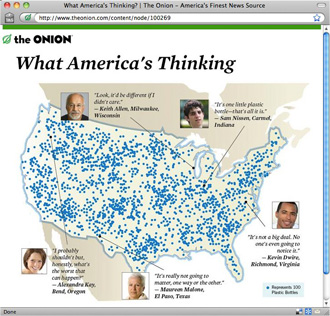Future Now
The IFTF Blog
The Onion and the Future of Persuasion
Leave it to satirical local newspaper The Onion to make an astute observation relevant to the future of persuasion. From their recent article
'How Bad For The Environment Can Throwing Away One Plastic Bottle Be?' 30 Million People Wonder
"It's not like I don't care, because I do, and most of the time I don't even buy bottled water," thought Missouri school teacher Heather Delamere, the 450,000th caring and progressive individual to have done so that morning, and the 850,000th to have purchased the environmentally damaging vessel due to being thirsty, in a huge rush, and away from home. "It's really not worth beating myself up over."
"What's one little bottle in the grand scheme of things, you know?" added each and every single one of them.
Now what if those 30 million people could have been reminded at the moment of decision—say, a trigger to connect their seemingly isolated behavior to the similar behaviors others were performing—would they be swayed enough to recycle?

How dynamic would these reminders need to be to have an impact? Could a simple sign work, something reading, "You know, Mr. Crawford in Akron, Ohio is also about to trash something recyclable. You two have something in common." A quick reminder positioned at the right time and place could be enough.
Or would interactive/networked technologies be most persuasive here looking down the road? Imagine...an RFID-enabled trash can to count and aggregate the number of mis-trashed recyclables. Or imagine...a small screen above the trash displaying real-time web results about recycling, to connect us at the moment of behavior to other people making similar decisions. What about...a god's-eye-view visualization of other eco-minded behaviors happening around the world?
Clearly, for a behavior this small, sophisticated inter-connected technologies sound like overkill. This leaves me thinking about the future directions for persuasion that leverage new perspectives on behavior—maybe even born of technological familiarity—without necessarily requiring new technologies. This Onion article is funny because there's a awareness that many people lead lives not far removed from our own and think in similar patterns. Social networks like Facebook and Twitter have revealed (and perhaps created) the similarities in our daily habits and patterns of thought.
Might persuasion in the future, across all domains and emerging new techniques, leverage more of this sense of connectedness, a greater literacy for "Long Zoom" thinking that scales from our individual actions up to cumulative effects, and back down again to influence our behavior? And even without technology...?
![]()



